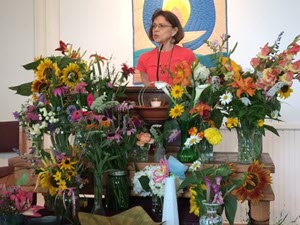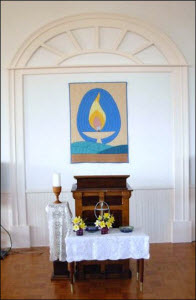
HUU Sermon Archives
Acceptance and Spiritual Growth
Elinor Mondale
July 13, 2003
Acceptance of one another and encouragement to spiritual growth in our congregations.
Let's start with a multiple-choice question I found on the UUA website.
Q: What does the third Principle, “acceptance of one another and encouragement to spiritual growth in out congregations,” mean?
- We accept only UUs as our intellectual and spiritual equals.
- Only UUs believe in spiritual growth.
- We believe that we should accept one another and keep on learning.
- A UU service is a lot like a Yoga class.
This principle is one I have always read without much thought and, at the time I agreed to talk about this principle some three or four months ago when July seemed an impossibly distant time, most of the other principles had been spoken for. Pat Geary asked me to choose between the remaining two and I took this one because I liked the words acceptance, one another, encouragement, growth. Warm, fuzzy words. But even as I chose it, I was blank about what it meant beyond the basic words.
Acceptance seemed a good place to begin. Acceptance, according to Webster, is much more than tolerating which Webster defines as “to allow, to permit, not to interfere with”. Acceptance is “approving reception”, Webster says. When you add “one another” we have a mutually approving reception and that makes it a warm, positive relationship which both the parties should feel good about.
But why is acceptance linked with spiritual growth? At first I thought they were two separate ideas linked together in an effort to maintain balance or for the sake of convenience. So at first I focused on “acceptance of one another” as a separate entity, and it sounded easy. You do your thing and I'll do mine. Just stay out of my way while I
do mine. I will tolerate you so long as you don't interfere with me. Most of us have bad-hair days, get-up-on-the-wrong-side-of-the-bed days, days when everything goes wrong, a day when we say, “Oh I hope I can put up with these siliy, muddle-headed, ridiculous and flat-out wrong idiots around me.”
About this time I came across the cartoon which I think all of you have. I loved it! That's me on one of those bad days, for sure. I want us to love one another and get the message out quickly and efficiently no matter how many jerks we have to knock down. If your ideas are different from mine, you had better shape up or ship out. Maybe you've felt that way, too?
Or more seriously, supposing your ideas of what should be done and how they should be done are different from mine? Suppose you are a morning person while I am a night one. Suppose you follow every rule, dot every i and cross every t, while I can't be bothered with such petty details. And we're trying to build a community together? What then? Must one of us leave? That seems extreme.
Or do we simply put up with each other? Could acceptance mean putting up with each other's eccentricities? After all we can put up with people we have no use or respect for. We can tolerate a lot of foolishness. We've all been in groups where someone keeps asking questions which have obvious answers. A sensitive leader recognizes the neediness and responds to it. An insensitive one uses humor or severity to squelch that person.
But if tolerating each other were all there was to acceptance, we would not need this third principle at all. Most of us can manage tolerance by ignoring people we don't like. Tolerance is doable and it is one step up over leaving a group because someone rubs you the wrong way. But it is not acceptance.
And about the time I got to this stage in my thinking, I found a book at GA called “Our Seven Principles” by Kenneth Collier. Acceptance, in this principle, he says,
"is not of behavior or ideas. It is of people in their basic humanity, their dignity and worth, their needs for companionship, growth, love, compassion, and justice."
To truly accept another we need to understand where they are coming from, what they have endured, to really “walk in their moccasins for three days”, as the Native American proverb goes. We need to empathize with them and appreciate them
Collier uses the example of a potentially harmful issue which threatened to divide UU's — a divide along generational lines - during the 1960's and 70's. “The gap, he says, was a deep failure to understand and accept genuine difference. Too many people on both sides of the generational line were more invested in their being right and the other side being wrong than they were in investing in the dignity of each other. They were more interested in being right than in compassion, justice, or acceptance.”
Collier, writing in 1997, says that this kind of divide seems to be happening in our congregations again and, again, it is largely along generational lines. There are deep differences over the issues of what religion and church are about, what worship is for and
how it should be conducted, the use of religious language and the nature of commitment to an institution, or to anything. Some ask “Why can't we have prayer?” while others ask “Why can't we have politics?” or “There's too much ritual and too little intellectual content.” We hear these arguments here in our own congregation, and we heard them at GA, too.
Who is right? Collier thinks that is the wrong question. Instead he poses a question for which he says he really has no answer. His question is “how can we meet both needs in our UU communities? How can we learn to create religious communities in which people with what appear to be incompatible needs can accept each other, embrace each other's human dignity and invest in each other's deeper growth and development, even when they do not share belief?”
The real issue, he said, is of acceptance of one another, of investing in each other's inherent worth and dignity. When I got to this point in Collier's argument, I realized that acceptance and support of spiritual growth go together naturally. You can't have support of spiritual growth without full acceptance of another's worth and human dignity; and you will not fully accept another person until you invest your energies toward that person's spiritual growth.
A way to test yourself on this principle, according to the Rev. Beverley Boke, is to ask yourself, “Have I compassionately offered others the opportunity for growth, and have I truly accepted people, even those who are not like me and those who do not fit my idea of “okay”?
While we were at GA attending meetings and feeling pleased about the numbers and spirituality of the crowds, the Boston Globe gave it front-page coverage.. The headline was “Words of “Reverence” Roil a Church”. The first paragraph read, “They're all here this weekend the Christians and the Jews, the Buddhists and the Wiccans, the theists and the atheists and the agnostics and the humanists all members of one religious denomination not sure how it feels about God.” NOTE: Full Article
Most of the article focused on Bill Sinkford's suggestion, actually first made in January and repeated in the opening ceremony, that a “language of reverence . . .that can acknowledge the presence of the holy in our lives” might be needed and might call for a change in our principles. The reactions of various ministers and members both for and against Sinkford's thesis was also included
UU's, the Globe said, have been moving away from humanism since the late 1980's. According to David M. Robinson, author of “The Unitarians and Universalists”, this shift reflects a general sense that there is something lacking in contemporary American society and that people are not being nurtured effectively. Hidden in the back page was the fact that Sinkford's push to reconsider the traditional religious language comes as he is actively trying to boost membership rolls, thus connecting the apparent need for spirituality in modern America with the “words of reverence”.
It has been fun studying this principle because it has lead me through unexpected paths in our hymnal, through the UUA. Org URL and especially to Bill Sinkford and his critics. One critic accused Sinkford of claiming that “we have in our Principles an affirmation of our faith which uses not one single piece of religious language. Not one.” And what, asked this critic ,is the word “spiritual” in our Third Principle if it is not religious language? Good point, but he also admitted that he was side-stepping the more weighty issues which Sinkford was tackling when he made his statements.
The Globe's article was blunt, to the point and exposed UUA to attacks. One Bostonian wrote an irate letter to the editor saying, “A group that rejects any creed or doctrine in the core of its operations and astoundingly eschews and condemns the mere invoking and mention of God in its communications can't rightly be called a church. It is simply a group of people lost, wandering, and bickering in darkness. . . .This is the sad and convoluted result when you let the laity run a “church” with their flawed human wisdom.”
And so, from wondering what deeper meaning, if any, this principle might have, I have evolved to a belief that this is the linchpin of our congregation and even our national organization. We must “Accept one another and encourage spiritual growth among one another and in our congregations” or we will end up lost, wondering and bickering in darkness, as the Globe's letter writer accused us of doing.
I'd like to end by reading a poem from Collier, “The Dance of Time”.
For the latest sermons and events at HUU, visit our Community Cafe.
Inclement
Weather Policy
Worship
Service Materials


UUs on YouTube
Our denomination has an official presence on YouTube! The Unitarian Universalist Association's YouTube site includes several videos and lots of interesting commentary.
Harrisonburg Unitarian Universalists 4101 Rawley Pike | Harrisonburg,
VA 22801
Mailing Address: | PO Box 96 | Harrisonburg, VA 22803
| (540) 867-0073 | Webmaster
HUU is a member of the Southern
Region of the Unitarian Universalist
Association
Privacy Policy &
Disclaimer
Site Design & Maintainence : Expression
Web Tutorials & Templates


